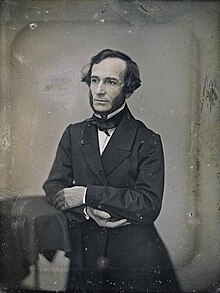Juan Bautista Alberdi | |
|---|---|
 Daguerreotype taken in Chile, dated between 1850 and 1853 | |
| Born | August 29, 1810 |
| Died | June 19, 1884 (aged 73) Neuilly-sur-Seine, France |
| Resting place | House of government of Tucumán |
| Other names | Figarillo |
| Notable work | Bases y puntos de partida para la organización política de la República Argentina |
| Era | 19th-century philosophy |
| Region | Western philosophy |
| School | Generation of '37's Classical liberalism - May Association |
| Language | Spanish |
Main interests | Politics Law |
| Signature | |
Preview warning: Page using Template:Infobox philosopher with unknown parameter "influences"
Preview warning: Page using Template:Infobox philosopher with unknown parameter "influenced"
| Part of a series on |
| Liberalism |
|---|
 |
Juan Bautista Alberdi (August 29, 1810 – June 19, 1884) was an Argentine political theorist and diplomat. Although he lived most of his life in exile in Montevideo, Uruguay and in Chile, he influenced the content of the Constitution of Argentina of 1853.
Based on his classical liberal and federal constitutional ideas, Alberdi at the same time tried to satisfy contrary social interests and establish a balance between national political centralization and provincial administrative decentralization: considering that both solutions would contribute to the consolidation and development of the original being of the single nation.[1]
- ^ Argüello, Santiago; Cavallo, Yanela (14 October 2020). "Liberalismo y Federalismo: De Constant a Alberdi". Revista de Historia Americana y Argentina. 55 (2): 127–150.